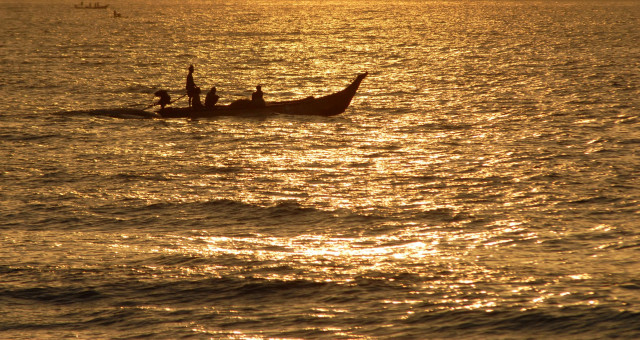Endangered: Plenty of fish in the sea? Not anymore
Illegal fishing nets have resulted in various fish species’ disappearance

Several species of fish which were commonly found in our waters in the 1980s are not there anymore. PHOTO: EPA
There really aren’t as many fish in the sea as you thought. About 10 per cent of the marine and brackish water species of Pakistan have vanished, thanks to the illegal use of fishing nets and lack of interest of the provincial fisheries department.
Ironically, there is no authentic survey to ascertain the number of species that have disappeared from Sindh’s creeks. However, according to fishermen and officials of the fisheries department, several species of fish which were commonly found in our waters in the 1980s are not there anymore.
“I don’t see hammerhead sharks, cobia, broadbill swordfish, sawfish and many others in the creeks now,” said Nawaz Ali, a fisherman from Rehri Goth.
The Food and Agriculture Organization of the United Nations conducted a survey in 1985 on the ‘Commercial Marine and Brackish Water Species of Pakistan’. It mentioned around 54 species found in the waters, which included cock-up, whiting ladyfish, four-lined, large-tooth flounder and striped threadfin. The survey said that these were the major species in Pakistani waters.
“More than 10 per cent of the species [that were there in the 1980s] are not found in our [Sindh’s] waters now,” confirmed fisheries director Rukhsana Asghar.
Both the fishermen community and the officials agree that the major reason of the extinction of the species is the lack of care by the ‘authorities’.
“The production has almost been reduced to 70 per cent,” said fisherman Muhammad Hussain.
According to Ali, he used to catch 100 kilogrammes of prawn each day 20 years ago. “Today, I can’t catch the same quantity even in a week with all my efforts.” He said that from Latt Basti to Keti Bunder, the fishermen used to have fish and other species in abundance.
“The situation changed when our fishermen started using small-sized nets,” said Hussain. “They [fishermen] didn’t realise how they were destroying their own source of earning.” He recalled how he had campaigned against illegal nets in the late 90s but the government didn’t pay any attention.
The fishermen and officials agree that besides fish, there were lobsters and turtles in Sindh’s creeks but they are not found any more due to the illegal fishing practices.
Now, the fishermen are afraid that thousands of families will be affected after 20 years if these trends continue and the government does nothing to curb them. Fishing is the sole source of income for them and they fear bad times ahead.
The director of fisheries department said that several rare species are being fished in Sindh’s water. “We are trying to restrict fishermen,” she said.
Talking about the species, she told The Express Tribune that most of the species breed in creeks and, after a certain period of time, go back to open sea. “If left for a certain period, one fish can produce hundreds more.”
An official of the fisheries department showed this correspondent the hundreds of stores selling illegal nets outside the department. According to him, Sindh’s fishermen use nets which hardly allow the smallest species found in creeks to pass through.
Asghar also told The Express Tribune about the sizes and weights of certain species. “Except for a few fish, all others could grow to at least five kilogrammes. The smaller fish are the food of the bigger ones but our fishermen catch them without any discrimination.”
The officials of the fisheries department are aware of the fact that some of the fish species which are being caught regularly are considered endangered. However, they don’t take action against the violators of the law.
“There are lacunas in the provincial law,” said an official seeking anonymity. “No one will cross the limits if the law is strict and is implemented in letter and spirit.”
Published in The Express Tribune, April 6th, 2015.



















COMMENTS
Comments are moderated and generally will be posted if they are on-topic and not abusive.
For more information, please see our Comments FAQ